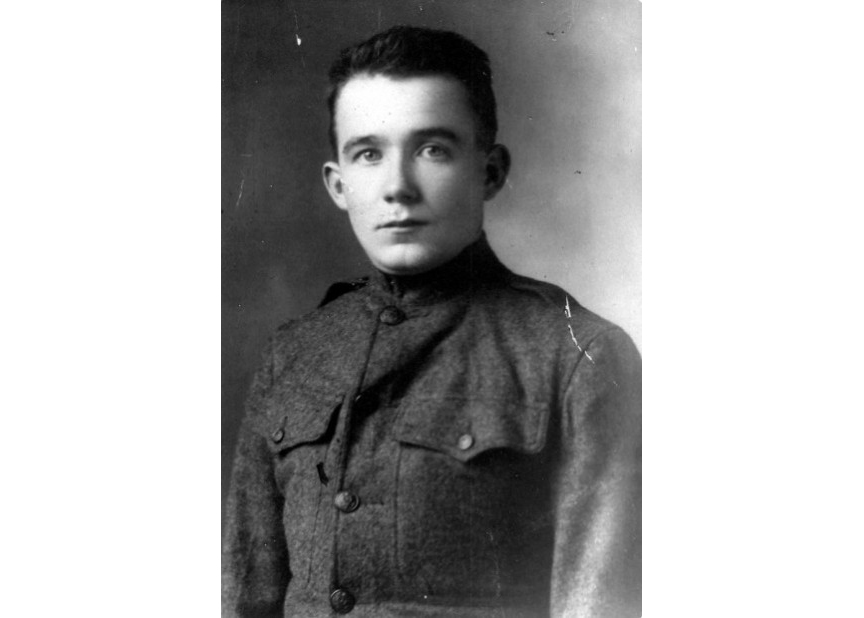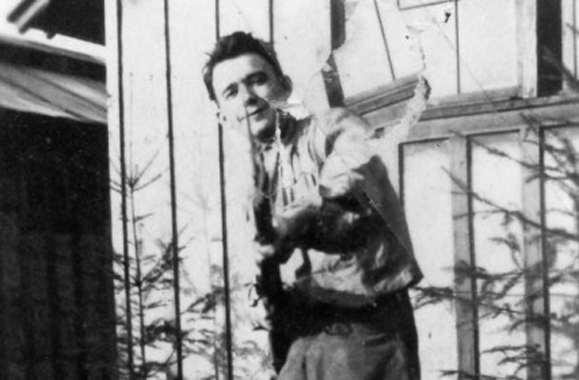April 6, 2017 marks the 100th anniversary of the entrance of the United States into World War I. Irish Americans were mixed about intervention in Europe’s war, some supporting the dictum “England’s difficulty isIreland’s opportunity,” but nonetheless hundred of thousands of them enlisted to fight. Among the Irish who fought in America’s military was Butte, Montana’s Peter Thompson. Tom Deignan tells his story.
℘℘℘
Peter Thompson (as noted in David Laskin’s excellent book The Long Way Home) left Ireland in 1914, just in time for the war to start, which dried up work in Butte’s copper mines. As war talk in the U.S. heated up, Thompson heard Irish relatives say they hoped the Kaiser and Germany would prevail over the hated Brits.
But Thompson decided to join the U.S. Army in 1917, serving with Company E, 362nd Infantry, 91st Wild West Division, rising to the rank of sergeant. Two of Thompson’s brothers, in Ireland, also fought on the side of the British.
The arguments in the Thompson family reflect the split in Irish America once the U.S. entered the war in 1917. Despite the family fissures, thousands of Irish Americans dutifully served in the war effort (and others, like Cork-born NYPD detective Tom Tunney cracked spy rings closer to home). From Congressional Medal of Honor winner “Wild Bill” Donovan to Father Francis Duffy, chaplain of the heavily-Irish “Fighting 69th,” Irish America produced many heroes during World War I. But the ancient wars of the old country heavily influenced many Irish Americans as well.

As Howard Blum notes in his new book Dark Invasion, about German espionage in America during World War I, a German spy working the New York waterfront “noted that many of the stevedores were Irish, and when he heard them openly snarling about having to load a ship flying the Union Jack” the spy believed this “was a visceral hatred he would exploit.”
During the war years, some Irish American figures openly agitated against Britain; Irish nationalist John Devoy even helped organize a massive Irish/German rally at Madison Square Garden on June 24, 1915.
“For the revolutionaries of Irish America, the war in Europe in 1914 posed none of the moral imperatives that the Second World War would impose,” Terry Golway writes in Irish Rebel, a biography of John Devoy, adding that many Irish nationalists in the U.S. believed “Ireland’s liberty…would best be served by a German victory.”
Once the U.S. entered the war in 1917, authorities very much began questioning the loyalties of Irish Americans. Irish publications were censored, banned or shut down while key Irish nationalists were indicted on charges of conspiracy or espionage after the Annie Larsen affair in 1917. This was an effort by an alliance involving India’s Ghadar Party, the Irish Republican Brotherhood and the German Foreign Office to ship American weapons (on the schooner Annie Larsen) to India for a revolt against the British Raj.
President Woodrow Wilson and others launched a series of attacks questioning the loyalty of anyone who did not seem “100 percent American.” Such charges would haunt the Irish for at least another decade, as evidenced by the post-war rise of the anti-Catholic Ku Klux Klan in the 1920s, culminating in the hateful attacks on Irish Catholic Al Smith in 1928, during the New York governor’s doomed race to become America’s first Catholic president.
Meanwhile, a civil war of sorts broke out amongst the Irish in America, after the Great War ended. Devoy and his allies feuded with Irish leader Eamon de Valera over the future of the Irish independence movement and whether or not to accept the Free State proposal in 1922.
In short, whether fighting on the Western Front, or agitating for Irish Freedom in New York, World War I was a tense, complicated experience for the Irish.
Which makes it easy to forget the quiet sacrifices of soldiers like Antrim’s Peter Thompson, who, upon returning from the war to Butte, Montana, was told by an Irish aunt: “You sound like an American!”
Thompson replied: “I am an American – I’ve my papers to prove it.” ♦
_______________
This article is excerpted from an earlier piece on the Irish and World War I, published in Irish America’s June / July 2014 issue. Read the full piece here.


Tom Tunney is my Great Grandfather on my mothers side. Have a few pic’s including his attendance at my parents wedding in 1943 as my dad was about to leave as a bombardier/navigator in the 8th Air Force. Great heritage.
Peter
Daniel Buckley of the Fighting 69th
https://en.wikipedia.org/wiki/Daniel_Buckley